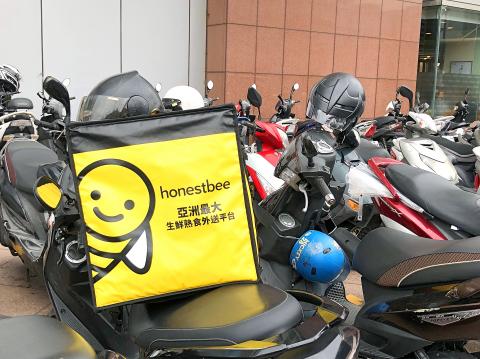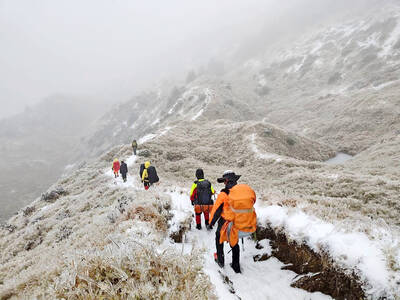Food and grocery delivery service Honestbee Taiwan on Saturday said that it has suspended its operations in the nation.
The Singapore-based company said it is trying to resolve payment issues and asked its employees not to report for duty.
“We regret to announce that our management team in Taiwan has received instructions from the Singapore headquarters office that we are to immediately suspend all our business operations in Taiwan,” the company said in a statement.

Photo: Chen Ping-hung, Taipei Times
The company said it is awaiting further instructions from the headquarters “to ensure that the operating problems can be mitigated and solutions found, then we will resume our business operations in Taiwan.”
The company launched in Taiwan in January 2016.
The suspension came only days after representatives of a “victims self-help association” on Wednesday held a protest outside Taipei City Hall to demand payment from the firm and asked the government to help get their money back.
Association spokespeople said that Honestbee Taiwan owed about NT$7.79 million (US$250,708) to mostly small businesses and shop owners across the nation.
A total of 286 food suppliers and restaurateurs were ready to file a class-action lawsuit against the company, they said.
Honestbee Taiwan’s official Web site and social media pages were still online as of press time last night, and people who said they were owed money by the company posted messages on them.
“We had 10 restaurant owners who had received back payments on Friday, so Honestbee Taiwan has not declared bankruptcy and is still operating. We will follow up to monitor the development of payments for our members,” association head Chen Chien-hao (陳建豪) said yesterday.
Honestbee Taiwan’s Taipei office had been empty over the past few days and it was closed after the suspension was announced, Chen said.
He said that Honestbee employees were instructed to work from home for their own safety, as there had allegedly been altercations with shop owners and creditors demanding payment, he said, citing unknown sources.
Company officials have promised to deal with the payments and other problems, saying they were waiting for funds to be transferred from Singapore, he added.

Trips for more than 100,000 international and domestic air travelers could be disrupted as China launches a military exercise around Taiwan today, Taiwan’s Civil Aviation Administration (CAA) said yesterday. The exercise could affect nearly 900 flights scheduled to enter the Taipei Flight Information Region (FIR) during the exercise window, it added. A notice issued by the Chinese Civil Aviation Administration showed there would be seven temporary zones around the Taiwan Strait which would be used for live-fire exercises, lasting from 8am to 6pm today. All aircraft are prohibited from entering during exercise, it says. Taipei FIR has 14 international air routes and

The Ministry of National Defense (MND) today released images of the military tracking China’s People's Liberation Army (PLA) movements during the latest round of Chinese drills around Taiwan. The PLA began "Justice Mission 2025" drills today, carrying out live-fire drills, simulated strikes on land and maritime targets, and exercises to blockade the nation's main ports. The exercises are to continue tomorrow, with the PLA announcing sea and air space restrictions for five zones around Taiwan for 10 hours starting from 8:30am. The ministry today released images showing a Chinese J-16 fighter jet tracked by a F-16V Block 20 jet and the

Snow fell on Yushan (Jade Mountain, 玉山) yesterday morning as a continental cold air mass sent temperatures below freezing on Taiwan’s tallest peak, the Central Weather Administration (CWA) said. Snowflakes were seen on Yushan’s north peak from 6:28am to 6:38am, but they did not fully cover the ground and no accumulation was recorded, the CWA said. As of 7:42am, the lowest temperature recorded across Taiwan was minus-5.5°C at Yushan’s Fengkou observatory and minus-4.7°C at the Yushan observatory, CWA data showed. On Hehuanshan (合歡山) in Nantou County, a low of 1.3°C was recorded at 6:39pm, when ice pellets fell at Songsyue Lodge (松雪樓), a

NO SHAME IN RETREAT: Hikers should consider turning back if the weather turns bad or if they do not have sufficient equipment, the Taroko park headquarters said Two people died of hypothermia over the weekend while hiking on Hsuehshan (雪山), prompting park authorities to remind hikers to bring proper equipment and consider their physical condition before setting out in the cold weather. Temperatures dropped over the weekend, bringing snow to high altitudes in Shei-pa National Park. One hiker, surnamed Lin (林), who on Friday was traveling with a group of six along the Hsuehshan west ridge trail, lost consciousness due to hypothermia and died, the Shei-pa National Park Headquarters said. On Saturday, another hiker, surnamed Tien (田), in a group of five on the southeast of the west